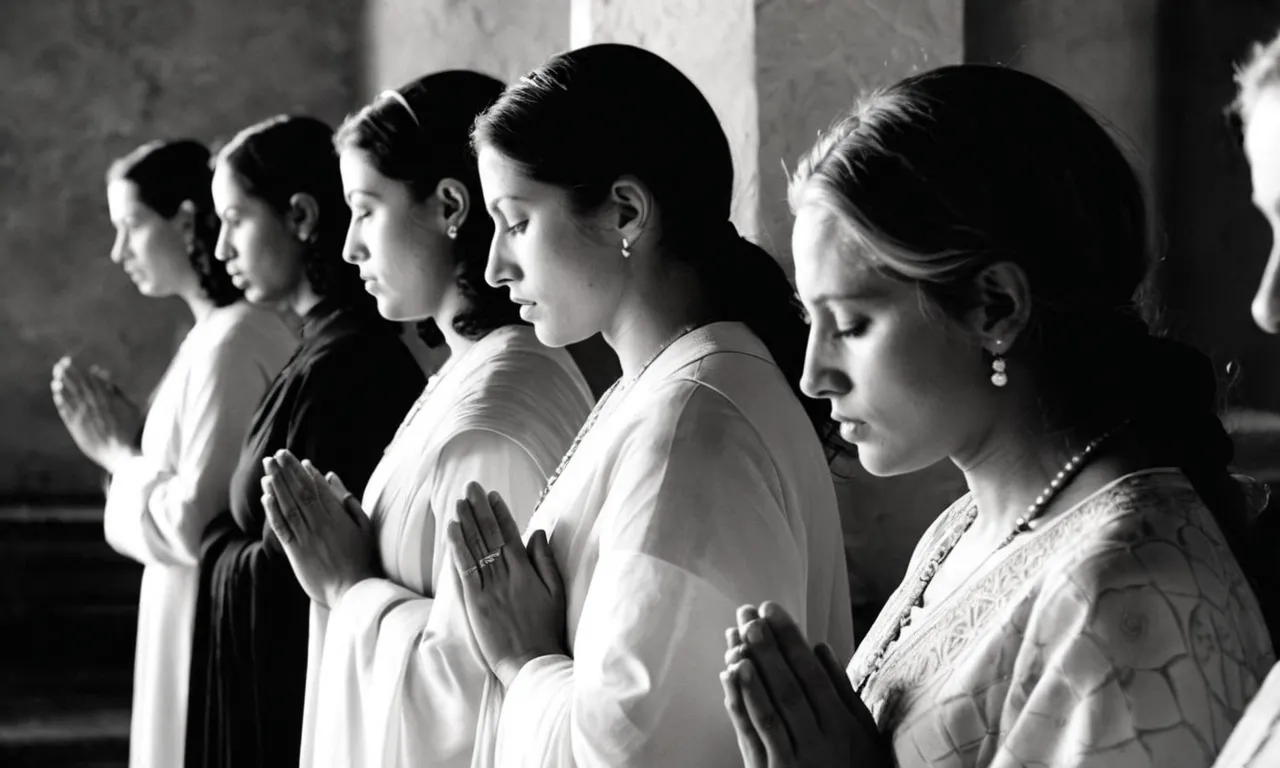Who Was The First Woman Apostle In The Bible?
The role of women in the early Christian church is a fascinating topic. Many are curious to know if there were any female apostles and how women contributed to the growth of the early church.
If you’re short on time, here’s a quick answer to your question: The Bible does not explicitly name any women as apostles. However, Junia is referred to as “outstanding among the apostles” in Romans 16:7, which some interpret as evidence that she may have been considered an apostle.
In this comprehensive article, we will examine the evidence for early Christian women leaders, analyze the meaning of Junia’s title, and explore the possible reasons why women apostles are not clearly named in the Bible.
The Meaning of Apostleship in the Early Church
The 12 Apostles of Jesus
The 12 apostles were the primary disciples called by Jesus during his earthly ministry. They were witnesses to Jesus’ life, death, and resurrection. After Jesus ascended to heaven, the apostles helped lead the early church.
They preached the gospel, planted churches, and wrote portions of the New Testament. The initial 12 apostles are listed in Matthew 10:2-4, Mark 3:16-19, Luke 6:13-16, and Acts 1:13. This group consisted of Simon Peter, Andrew, James and John (the sons of Zebedee), Philip, Bartholomew, Thomas, Matthew, James (the son of Alphaeus), Thaddaeus, Simon the Zealot, and Judas Iscariot.
After Judas betrayed Jesus and later committed suicide, Matthias was chosen to replace him (Acts 1:15-26).
Other Apostles in the New Testament
In addition to the original 12 apostles, the New Testament refers to others as apostles as well. The apostle Paul, also known as Saul of Tarsus, was a zealous persecutor of Christians before his dramatic conversion on the road to Damascus (Acts 9).
Though not part of the original 12, Paul became one of the most prominent apostles, authoring a large portion of the New Testament. Other individuals referred to as apostles in the New Testament include Barnabas (Acts 14:14), James the brother of Jesus (Galatians 1:19), Andronicus and Junia (Romans 16:7), Apollos (1 Corinthians 4:6-9), and Silas and Timothy (1 Thessalonians 1:1, 2:6).
These men and women accompanied Paul and others on missionary journeys to spread the gospel.
Qualifications for Apostleship
In the early church, the primary role of an apostle was to witness and preach the gospel of Jesus Christ. To fulfill this role, the New Testament lays out qualifications for apostleship. First, an apostle had to be an eyewitness of the resurrected Christ, in order to testify to his resurrection (Acts 1:22, 1 Corinthians 9:1).
Second, an apostle had to be personally appointed by the Lord Jesus Christ (Mark 3:13-14). Finally, an apostle had to perform signs and wonders to authenticate their teaching (2 Corinthians 12:12). While these qualifications applied specifically to the apostles of the first century, they provide helpful insight into the deeper meaning of apostleship – faithfully bearing witness to Jesus by proclaiming the gospel.
Prominent Women in Early Church Leadership
Mary Magdalene
Mary Magdalene was one of Jesus’ most devoted followers. She traveled with Jesus and provided for him and the disciples financially. She was present at Jesus’ crucifixion and was the first person to see Jesus after his resurrection, earning her the title “Apostle to the Apostles.”
Mary Magdalene’s influence and leadership were invaluable in the early Christian movement.
Phoebe
Phoebe was a leader in the early church in Cenchrea. Paul refers to her as a “deacon” in Romans 16:1, indicating she likely held a formal leadership position. She delivered Paul’s letter to the Romans and provided support for many, including Paul himself.
Her high level of influence, service, and patronage in the early church cannot be understated.
Priscilla
Priscilla (often listed as Prisca in the Bible) and her husband Aquila were influential missionaries and teachers in the early church. They instructed the learned Apollos and established churches in Corinth and Ephesus.
Notably, Priscilla’s name often comes before her husband’s, suggesting her prominence. Herstrategic church planting and discipleship contributed greatly to early church growth.
Other Influential Women
Many other women held important roles in the early church, including Philip’s daughters who were well-known prophets, Lydia who led a church that met in her home, Chloe who led a church in Corinth, Euodia and Syntyche who were co-workers with Paul, and Junia who was respected among the apostles.
While men held most formal leadership positions, these women exercised significant influence in ways that furthered the gospel.
Junia – Outstanding Among the Apostles?
The Mention of Junia in Romans 16:7
In his letter to the Romans, the apostle Paul sends greetings to a number of his fellow believers in Rome. One greeting in Romans 16:7 stands out: “Greet Andronicus and Junia, my fellow Jews who have been in prison with me.
They are outstanding among the apostles, and they were in Christ before I was.” This verse contains the only biblical reference to a woman named Junia. Paul identifies Andronicus and Junia as apostles who became believers before he did. They had suffered imprisonment for the faith like Paul.
The debate centers around whether Junia was actually considered an apostle like Paul and the Twelve.
Debates Over Junia’s Role and Title
In early church history, Junia was unanimously recognized as a female apostle. John Chrysostom (c. 349-407) commented, “To be an apostle is something great. But to be outstanding among the apostles—just think what a wonderful song of praise that is!
They were outstanding on the basis of their works and virtuous actions. Indeed, how great the wisdom of this woman must have been that she was deemed worthy of the title of apostle.” However, beginning in the 13th century, questions arose over Junia’s status, with some suggesting she was merely well-known among the apostles rather than an apostle herself.
This controversy continues today among scholars.
Was Junia Really Considered an Apostle?
Several factors indicate that Junia was indeed regarded as an apostle in the early church:
- The Greek wording Paul uses suggests Andronicus and Junia were “outstanding among the apostles,” not just known to them. Paul parallels this language to when he calls James “the brother of the Lord” (Galatians 1:19), pointing to James’ leadership position.
- In all other cases in the New Testament, the Greek phrase “outstanding among” refers to a subgroup within a broader group. So “outstanding among the apostles” means Junia was an apostle.
- The patristic evidence from early church fathers agrees that Junia was an apostle, not just known to apostles. As mentioned, Chrysostom called her an apostle, not just well-known. Later translators and scribes found this hard to believe about a woman.
So while debate continues, evidence indicates Paul identified Junia as an influential early Christian apostle: “They are outstanding among the apostles.” She serves as another reminder that Jesus called both men and women to lead in advancing the gospel.
The Absence of Female Apostles in Scripture
Cultural Barriers for Women
In the patriarchal culture of the 1st century, women faced many barriers to taking on leadership roles in society and religion. Women were expected to focus on domestic duties and raising children, not preach, teach, or lead (1 Timothy 2:12).
Their testimony was considered less valid than men’s in court. It was countercultural for women to assume authoritative positions over men. This cultural backdrop helps explain the predominance of male apostles chosen by Jesus.
The Priority of Male Leaders
Jesus broke gender barriers by teaching women and welcoming them as disciples when rabbis typically only taught men. Yet when choosing his twelve apostles, who would lead his movement after him, Jesus selected only men. This may reflect the priority placed on male leadership common to that period.
The twelve apostles represented the twelve tribes of Israel, which were patriarchal. So there were sound cultural reasons Jesus focused on male apostles, even though he valued women equally.
Omission vs Prohibition of Women Apostles
The absence of female apostles among the twelve does not necessarily imply women could not serve in apostolic roles in the early church. The New Testament nowhere prohibits women from being apostles. In fact, Junia is called an “outstanding apostle” in Romans 16:7.
Some contend Junia was a man, but the patristic understanding was that Junia was a woman. Others like Mary Magdalene and Priscilla functioned in apostolic ways. So the omission of female apostles among the twelve does not mean women were excluded from apostolic ministry in the early church.
Conclusion
While Scripture does not explicitly name any female apostles, Junia and other early Christian women clearly played significant roles in the early church.
Debates continue over whether women like Junia were considered apostles or what barriers existed to them being recognized as such.
Nevertheless, women were undoubtedly leaders, evangelists, and teachers in first-century Christianity, paving the way for their continued contributions throughout the history of the church.








